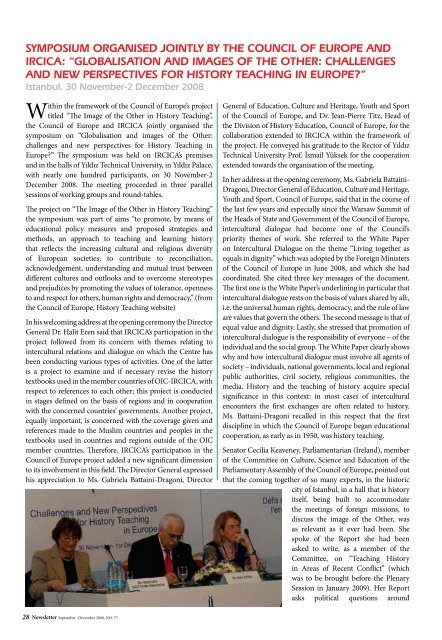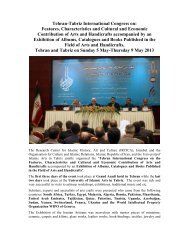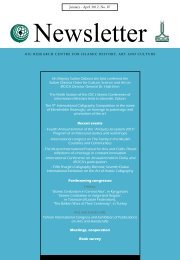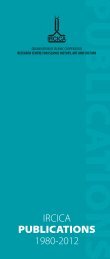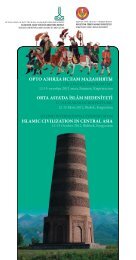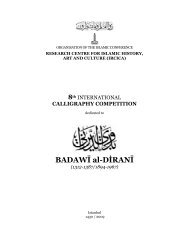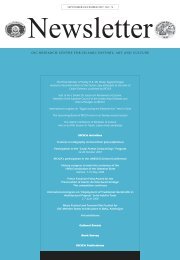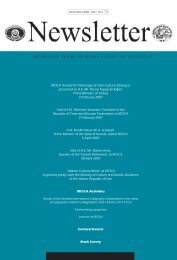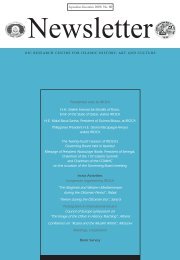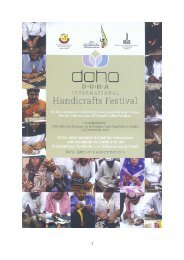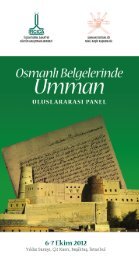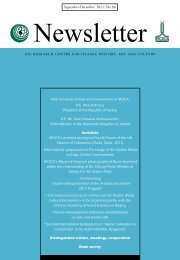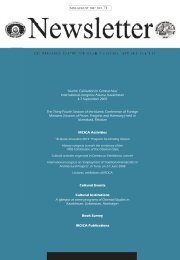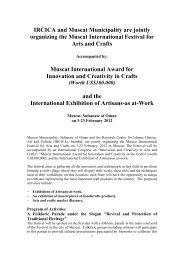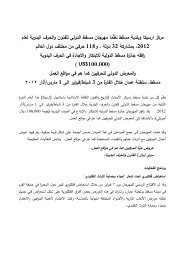IRCICA Newsletter Issue 77
IRCICA Newsletter Issue 77
IRCICA Newsletter Issue 77
- No tags were found...
You also want an ePaper? Increase the reach of your titles
YUMPU automatically turns print PDFs into web optimized ePapers that Google loves.
SYMPOSIUM ORGANISED JOINTLY BY THE COUNCIL OF EUROPE AND<strong>IRCICA</strong>: “GLOBALISATION AND IMAGES OF THE OTHER: CHALLENGESAND NEW PERSPECTIVES FOR HISTORY TEACHING IN EUROPE?”Istanbul, 30 November-2 December 2008Within the framework of the Council of Europe’s projecttitled “The Image of the Other in History Teaching”,the Council of Europe and <strong>IRCICA</strong> jointly organised thesymposium on “Globalisation and images of the Other:challenges and new perspectives for History Teaching inEurope?” The symposium was held on <strong>IRCICA</strong>’s premisesand in the halls of Yıldız Technical University, in Yıldız Palace,with nearly one hundred participants, on 30 November-2December 2008. The meeting proceeded in three parallelsessions of working groups and round-tables.The project on “The Image of the Other in History Teaching”the symposium was part of aims “to promote, by means ofeducational policy measures and proposed strategies andmethods, an approach to teaching and learning historythat reflects the increasing cultural and religious diversityof European societies; to contribute to reconciliation,acknowledgement, understanding and mutual trust betweendifferent cultures and outlooks and to overcome stereotypesand prejudices by promoting the values of tolerance, opennessto and respect for others, human rights and democracy.” (fromthe Council of Europe, History Teaching website)In his welcoming address at the opening ceremony the DirectorGeneral Dr. Halit Eren said that <strong>IRCICA</strong>’s participation in theproject followed from its concern with themes relating tointercultural relations and dialogue on which the Centre hasbeen conducting various types of activities. One of the latteris a project to examine and if necessary revise the historytextbooks used in the member countries of OIC-<strong>IRCICA</strong>, withrespect to references to each other; this project is conductedin stages defined on the basis of regions and in cooperationwith the concerned countries’ governments. Another project,equally important, is concerned with the coverage given andreferences made to the Muslim countries and peoples in thetextbooks used in countries and regions outside of the OICmember countries. Therefore, <strong>IRCICA</strong>’s participation in theCouncil of Europe project added a new significant dimensionto its involvement in this field. The Director General expressedhis appreciation to Ms. Gabriela Battaini-Dragoni, DirectorGeneral of Education, Culture and Heritage, Youth and Sportof the Council of Europe, and Dr. Jean-Pierre Titz, Head ofthe Division of History Education, Council of Europe, for thecollaboration extended to <strong>IRCICA</strong> within the framework ofthe project. He conveyed his gratitude to the Rector of YıldızTechnical University Prof. İsmail Yüksek for the cooperationextended towards the organisation of the meeting.In her address at the opening ceremony, Ms. Gabriela Battaini-Dragoni, Director General of Education, Culture and Heritage,Youth and Sport, Council of Europe, said that in the course ofthe last few years and especially since the Warsaw Summit ofthe Heads of State and Government of the Council of Europe,intercultural dialogue had become one of the Council’spriority themes of work. She referred to the White Paperon Intercultural Dialogue on the theme “Living together asequals in dignity” which was adopted by the Foreign Ministersof the Council of Europe in June 2008, and which she hadcoordinated. She cited three key messages of the document.The first one is the White Paper’s underlining in particular thatintercultural dialogue rests on the basis of values shared by all:,i.e. the universal human rights, democracy, and the rule of laware values that govern the others. The second message is that ofequal value and dignity. Lastly, she stressed that promotion ofintercultural dialogue is the responsibility of everyone – of theindividual and the social group. The White Paper clearly showswhy and how intercultural dialogue must involve all agents ofsociety – individuals, national governments, local and regionalpublic authorities, civil society, religious communities, themedia. History and the teaching of history acquire specialsignificance in this context: in most cases of interculturalencounters the first exchanges are often related to history.Ms. Battaini-Dragoni recalled in this respect that the firstdiscipline in which the Council of Europe began educationalcooperation, as early as in 1950, was history teaching.Senator Cecilia Keaveney, Parliamentarian (Ireland), memberof the Committee on Culture, Science and Education of theParliamentary Assembly of the Council of Europe, pointed outthat the coming together of so many experts, in the historiccity of Istanbul, in a hall that is historyitself, being built to accommodatethe meetings of foreign missions, todiscuss the image of the Other, wasas relevant as it ever had been. Shespoke of the Report she had beenasked to write, as a member of theCommittee, on “Teaching Historyin Areas of Recent Conflict” (whichwas to be brought before the PlenarySession in January 2009). Her Reportasks political questions around28<strong>Newsletter</strong> September -December 2008, NO: <strong>77</strong>


